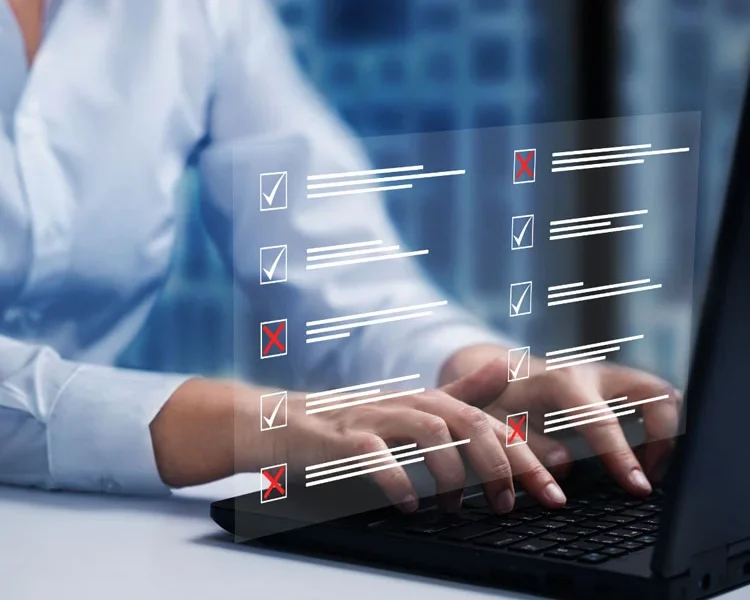Virtual paralegal support that feels in-house.
Our US-based virtual paralegals work just like in-house team members, but without the overhead. Choose flexible packages that scale with your practice needs.
US-based paralegals
Support from professionals with real law firm experience.
Discovery and drafting
We handle pleadings, filings, summaries, discovery, and prep.
Key practice areas
Family, probate, litigation, personal injury, immigration, and more.
Case coordination
We assist with scheduling, deadlines, and file management.
Flexible bundles
Start with a bundle of 10 hours then top-up as your caseload grows.
Free consultation
Book a free consult to share your needs and explore how we can help.
Virtual paralegal support that
feels in-house.
US-based paralegals
Support from professionals with real law firm experience.
Discovery and drafting
From pleadings to production logs, we’ve got you covered.
Key practice areas
We support family, litigation, PI, immigration, probate, and more.
Case coordination
We assist with scheduling, deadlines and file management.
Flexible bundles
Start with a bundle of 10 hours then top-up as your caseload grows.
Free consultation
Book a free consult to share your needs and explore how we can help.

Paralegal support that fits your caseload.
From document-heavy litigation prep to deadline tracking and client updates, our experienced virtual paralegals help lighten the load, so your team can focus on higher-value work.
Use our service for:
- Document production
- Draft discovery & responses
- Trial, mediation and deposition support
- Reviews, prep & attendance
- Chronologies, medical records etc
- Social security/disability filing/appeals
- Pre-litigation case management
- Litigation case management
- Chapter 7, 13, 11 bankruptcies
- Legal research
- Witness interviews
- Mortgage / lien foreclosures
We work like part of your team, without adding to your headcount.

“Attorneys often come to us when they’re drowning in casework but don’t want to rush a new hire. Our paralegals step in quickly, work within your systems, and start delivering real value within days.”
Lorren, Account Executive

Paralegal support that fits your caseload.
From document-heavy litigation prep to deadline tracking and client updates, our experienced virtual paralegals help lighten the load, so your team can focus on higher-value work.
Use our service for:
- Document production
- Draft discovery & responses
- Trial, mediation and deposition help
- Reviews, prep & attendance
- Chronologies, medical records etc
- SSA/disability filing/appeals
- Pre-litigation case management
- Litigation case management
- Chapter 7, 13, 11 bankruptcies
- Legal research
- Witness interviews
- Mortgage / lien foreclosures
We work like part of your team, without adding to your headcount.
How it works.
We consult
We start with a free consultation to understand your needs and priorities.
We scope
You receive a paralegal profile and a quote for the expected hours.
You confirm
Once you accept, we allocate your hours and introduce your paralegal.
We work
Your paralegal gets to work, checking in regularly to ensure satisfaction.
Why law firms choose our virtual paralegals.

Support that adapts to your firm’s workload.
Whether you need a bundle of 10 hours or full-time case support, our virtual paralegals scale with your caseload.
- Choose the bundle that best covers your need
- Support one matter or multiple cases
- Ideal for solo or growing firms

Legal experience where it matters most.
Our paralegals are trained in the demands of litigation, filings, and court procedure, so they’re ready from day one.
- Skilled in discovery and document prep
- Experienced with US court systems and workflows
- Work within your preferred tools and templates

Build trust without adding overhead.
Clients don’t see the difference, but you’ll feel it. We provide professional, consistent support while reducing internal admin strain.
- Professional tone in all communications
- Keep your team focused on high-value work
- No long-term hiring or onboarding delays
Why law firms choose our virtual paralegals.
Scalable support for busy firms.
Use just the hours you need, without the hiring overhead.
- Choose your preferred bundle of hours.
- Support one matter or multiple cases.
- Ideal for solo or growing firms.
On-demand legal support.
Our paralegals are trained and qualified in US law firm work..
- Skilled in discovery and document prep.
- Experience with US court rules and filings.
- Work with preferred tools and templates.
Build trust without overhead.
Keep your client service high while reducing admin strain.
- Professional tone in all communications.
- Free your in-house team for high-value work.
- No long-term hiring or onboarding delays.
Paralegal service pricing.
Our experienced remote paralegals seamlessly integrate with your practice, allowing you to focus on what matters most.
Your paralegal support:
- Includes a free consultation
- Is US-based
- Is professionally certified
- Abides by data protection protocols
- Adheres to security standards
- Respects your deadlines
LexParalegal Lite
10 Hours
$800
LexParalegal Pro
40 Hours
$2800
LexParalegal Plus
20 Hours
$1500
LexParalegal Max
80 Hours
$5200
Paralegal
service fees.
Our experienced remote paralegals seamlessly integrate with your practice to handle essential legal work, allowing you to focus on what matters most.
LexParalegal Lite
10 hours
$800
LexParalegal Plus
20 hours
$1,500
LexParalegal Pro
40 hours
$2,800
LexParalegal Max
80 hours
$5,200
What we can help with:
- Includes a free consultation
- Is US-based
- Is professionally certified
- Abides by data protection protocols
- Adheres to security standards
- Respects your deadlines
Other ways we can assist you.

Inbound call answering.
Live virtual receptionists expertly handle your calls for legal practices, ensuring a seamless client experience.

Appointment scheduling.
Consultations booked directly into your calendar, helping you stay organized so you never miss a new client opportunity.

Legal intake.
Filter spam and capture key client details so only qualified, high-value leads reach your legal team.

Outbound calling.
Proactive follow-ups, reminders, and case updates, all seamlessly handled by virtual receptionists.
Other ways
we can assist you.

Inbound call answering.
Live virtual receptionists expertly handle your calls for legal practices, ensuring a seamless client experience.

Appointment scheduling.
Consultations booked directly into your calendar, helping you stay organized so you never miss a new client opportunity.

Outbound calling.
Proactive follow-ups, reminders, and case updates, all seamlessly handled by virtual receptionists.

Legal intake.
Filter spam and capture key client details so only qualified, high-value leads reach your legal team.
Frequently
Asked Questions.
Frequently Asked Questions.
Find out more.
Have questions? Please fill in your details and we’ll be in touch.
* Required Fields
Get started for free!
LexHelper is the law firm virtual reception solution you’ve been searching for, with US-based receptionists. Try free for 7 days.
Note: Our free trial excludes outbound calling and some add-on services.
Want to try our legal answering services for free?
LexHelper is the law firm virtual reception solution you’ve been searching for, with US-based receptionists. Get started with our no-obligation 7-day free trial.
Note: Our free trial excludes outbound calling and some add-on services.
Our clients’ verdict.
We’re for solo attorneys and law firms of any size.









CASE STUDY
24/7 virtual switchboard for team of 20.
Discover how LexHelper helped a United States law firm save on a receptionist’s wages and still have calls transferred to attorneys or other staff as needed.

